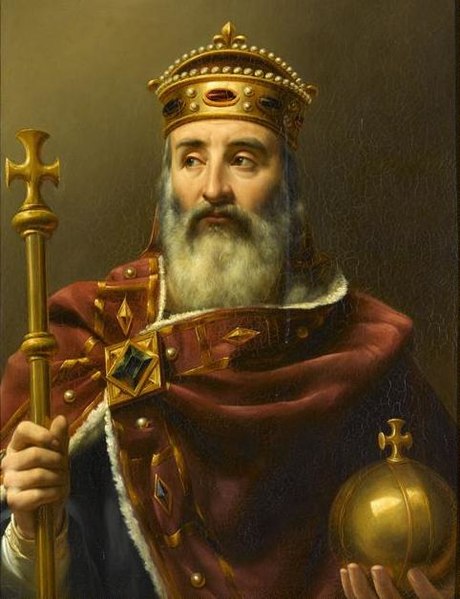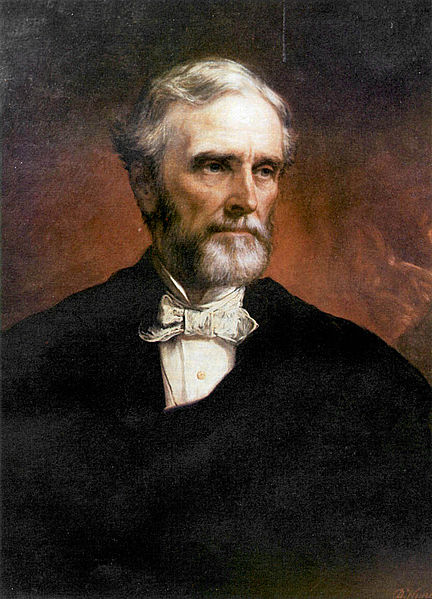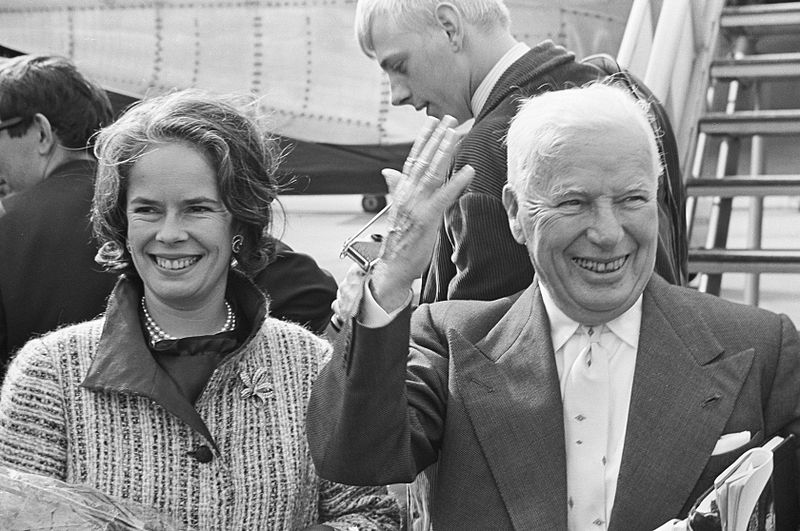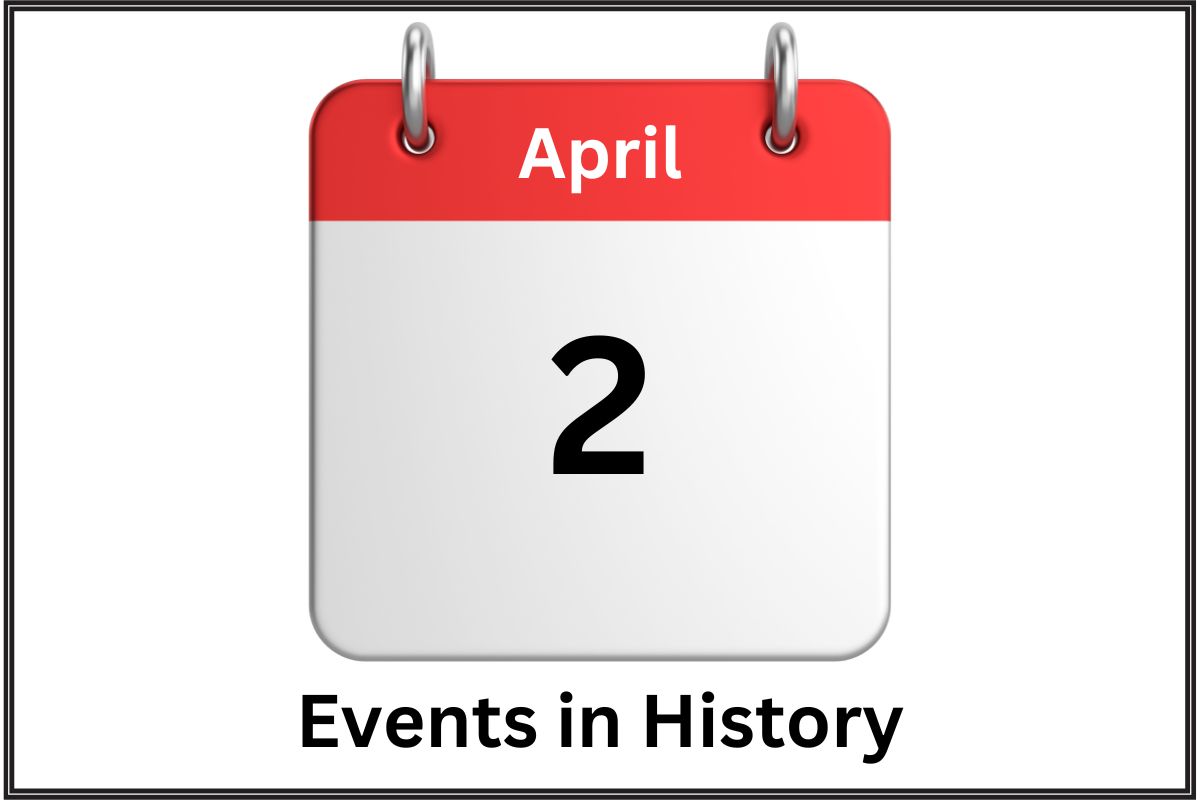This article highlights pivotal events that took place on April 2nd throughout history, reflecting moments of significant change and development across various spheres.
From the rise of influential leaders like Charlemagne to major diplomatic and technological milestones, such as the adoption of the Arms Trade Treaty, each event underscores the diverse ways in which these moments have shaped our world.
Through this exploration, we gain insights into the multifaceted tapestry of human history, marked by innovation, conflict, and progress.
April 2nd Events in History
742: Birth of Charlemagne, King of the Franks and Lombards, and Emperor of the Carolingians
Charlemagne, also known as Charles the Great or Carolus Magnus, was born on April 2, 742. He became King of the Franks in 768 and later King of the Lombards and Emperor of the Carolingians.
His reign is often associated with the Carolingian Renaissance, a revival of art, religion, and culture through the auspices of the church. Charlemagne’s efforts to create a centralized empire set the foundations for the modern states of France and Germany.
Also Read: April 1 – On this Day in History
He was crowned Emperor by Pope Leo III on Christmas Day in the year 800, marking the symbolic beginning of the Holy Roman Empire.

1453: Mehmed II begins his siege of Constantinople (Istanbul), which falls on May 29
On April 2, 1453, Mehmed II, also known as Mehmed the Conqueror, began the siege of Constantinople, the capital of the Byzantine Empire.
This historical event marked the end of the Byzantine Empire, which had lasted for over a thousand years. The siege lasted for 53 days, culminating in the fall of the city on May 29, 1453.
Also Read: April 3rd Events in History
The fall of Constantinople represented a pivotal moment in world history, marking the end of the medieval period and the beginning of the Renaissance. It also led to the spread of the Ottoman Empire into Eastern Europe.
1513: Juan Ponce de León makes the first recorded landing in Florida
Juan Ponce de León, a Spanish explorer and conquistador, made the first recorded landing on the North American continent in what is now Florida on April 2, 1513.
He had set out in search of the mythical Fountain of Youth, a legend that promised eternal youth to those who drank from its waters.
Instead, he landed on the coast of Florida, becoming the first European to do so. He named the land “La Florida” due to its lush, floral vegetation and because it was the Easter season, known as “Pascua Florida” in Spanish.
1800: Ludwig van Beethoven leads the premiere of his First Symphony in Vienna
On April 2, 1800, Ludwig van Beethoven conducted the premiere of his First Symphony in C major, Op. 21, in Vienna. This performance marked Beethoven’s emergence as a masterful composer in the classical music tradition, building upon the legacy of his predecessors, Mozart and Haydn.
The First Symphony was well received and is notable for its use of sforzandi and its lively character, showcasing Beethoven’s innovative approach to the symphonic form and his willingness to push musical boundaries.
1865: American Civil War: Confederate President Jefferson Davis and most of his Cabinet flee the Confederate capital of Richmond, Virginia
As the American Civil War neared its end, Confederate President Jefferson Davis and most of his Cabinet fled the capital of Richmond, Virginia, on April 2, 1865.
This event occurred as Union forces, under the command of General Ulysses S. Grant, broke through Confederate lines, signaling the imminent fall of Richmond.
The evacuation marked the collapse of the Confederate government and was a precursor to the Confederacy’s ultimate defeat. Just over a week later, on April 9, 1865, General Robert E. Lee surrendered to Grant at Appomattox Court House, effectively ending the Civil War.

1900: The United States Congress passes the Foraker Act, giving Puerto Rico limited self-rule
The Foraker Act, passed on April 2, 1900, established a civilian government in Puerto Rico, which had become a United States territory following the Spanish-American War in 1898. The act allowed for a limited degree of popular government, including a locally elected House of Representatives.
However, the Governor and the Executive Council were appointed by the President of the United States, with the latter also serving as the upper house of the legislative assembly. This act was a significant step in the political development of Puerto Rico, laying the groundwork for further changes in its status and governance in the years to come.
1902: The first full-time movie theater in the United States, the Electric Theatre, opens in Los Angeles
On April 2, 1902, the Electric Theatre opened in Los Angeles, marking the debut of the first full-time movie theater in the United States. This pioneering venue heralded the beginning of the American cinema industry, moving films from temporary showings in vaudeville theaters or as part of other entertainment acts to a dedicated space for the cinematic experience.
The Electric Theatre’s opening signified the growing popularity and commercial potential of motion pictures, contributing to the rapid development of the film industry, both in Hollywood and across the nation.
1917: President Woodrow Wilson asks the U.S. Congress for a declaration of war on Germany
On April 2, 1917, in response to the resumption of unrestricted submarine warfare by Germany and the Zimmermann Telegram (which proposed a military alliance between Germany and Mexico against the United States), President Woodrow Wilson delivered a speech to a joint session of Congress, requesting a declaration of war against Germany.
This request marked a pivotal turn in American foreign policy, shifting from neutrality to direct involvement in World War I. Congress granted Wilson’s request on April 6, 1917, officially entering the United States into the conflict on the side of the Allies.

1972: Charlie Chaplin returns to the United States for the first time since being labeled a communist during the Red Scare in the early 1950s
Charlie Chaplin, the iconic film star and director, returned to the United States on April 2, 1972, for the first time since he left in the early 1950s amidst accusations of communist sympathies during the Red Scare.
Chaplin, who had lived in self-imposed exile in Switzerland to avoid the political persecution of the McCarthy era, came back to the U.S. to receive an honorary Academy Award for his unparalleled contributions to the film industry. His return was met with acclaim, signaling a late acknowledgment of his artistic genius and the injustice of the accusations against him.
1980: The United States Congress establishes the United States Synthetic Fuels Corporation
In response to the energy crises of the 1970s and the growing concern over dependence on foreign oil, the United States Congress established the United States Synthetic Fuels Corporation on April 2, 1980.
This corporation was tasked with developing and commercializing alternative energy sources, particularly synthetic fuels derived from coal, shale, and other materials.
The initiative aimed to reduce the country’s reliance on imported oil by increasing the supply of domestic energy resources. However, the corporation faced various challenges, including high production costs and falling oil prices, leading to its eventual dissolution in the mid-1980s.
1982: Argentina invades the Falkland Islands, sparking the Falklands War
On April 2, 1982, Argentine forces landed on the Falkland Islands, a remote British overseas territory in the South Atlantic, claiming sovereignty over them. This invasion led to the Falklands War between the United Kingdom and Argentina. The conflict lasted for 74 days and ended with the British regaining control of the islands.
The war had significant military and political implications, reinforcing the UK’s claim to the islands, while in Argentina, it contributed to the downfall of the ruling military junta. The conflict left over 900 soldiers dead and solidified the Falkland Islanders’ strong identity as British citizens.
1991: Rita Johnston becomes the first female Premier of a Canadian province (British Columbia)
Rita Johnston made history on April 2, 1991, by becoming the first woman to serve as Premier of a Canadian province, specifically British Columbia. Johnston, a member of the Social Credit Party, succeeded Bill Vander Zalm following his resignation.
Her tenure as Premier was notable not just for her pioneering role as a woman in Canadian provincial politics but also for the challenging economic conditions and internal party disputes she faced. Though her time in office was brief, Johnston’s leadership paved the way for future female politicians in Canada.
1992: Mafia boss John Gotti is convicted of murder and racketeering and is later sentenced to life in prison
John Gotti, the notorious leader of the Gambino crime family in New York City, was found guilty on April 2, 1992, of 13 charges, including murder and racketeering. His conviction was a landmark victory for the U.S. government in its efforts to combat organized crime.
Known as “The Teflon Don” for his ability to avoid convictions in earlier trials, Gotti’s luck ran out due to the testimony of his underboss, Salvatore “Sammy the Bull” Gravano. Gotti was sentenced to life in prison without the possibility of parole, marking the end of his infamous career in organized crime.
2002: Israeli forces surround the Church of the Nativity in Bethlehem into which armed Palestinians had retreated
During the Second Intifada, a conflict that intensified in the early 2000s between Israel and Palestinian militants, Israeli forces besieged the Church of the Nativity in Bethlehem on April 2, 2002. Armed Palestinian militants had taken refuge inside the church, believed to be the birthplace of Jesus Christ, leading to a tense standoff.
The siege lasted for about a month, drawing international attention to the complexities of the Israeli-Palestinian conflict. The standoff ended with an agreement that saw the militants exiled to several different countries, and the episode remains a significant point of contention in the ongoing conflict.
2005: Pope John Paul II dies; over 4 million people travel to the Vatican to mourn him
Pope John Paul II passed away on April 2, 2005, at the age of 84, ending one of the longest and most influential papacies in modern history.
His death prompted an outpouring of grief from around the world, with over four million people traveling to the Vatican to pay their respects.
John Paul II was widely admired for his efforts to promote peace and reconciliation across the globe, his outreach to other religions, and his role in the fall of communism in Eastern Europe, particularly in his native Poland.
His funeral was one of the largest gatherings of heads of state outside of the United Nations, underscoring his impact on the world stage.
2006: Over 60 tornadoes break out, hardest hit is in Tennessee with 29 people killed
On April 2, 2006, a devastating series of tornadoes struck across the central United States, with Tennessee experiencing the worst of the outbreak. Over 60 tornadoes were reported, causing widespread destruction and leading to the deaths of 29 people in Tennessee alone.
The intensity and suddenness of the storms caught many by surprise, highlighting the destructive power of nature and the need for effective emergency preparedness and response systems. The 2006 tornado outbreak remains one of the deadliest in recent U.S. history, with communities across the affected regions coming together to rebuild in the aftermath.
2013: The United Nations General Assembly adopts the Arms Trade Treaty to regulate the international trade in conventional arms
On April 2, 2013, the United Nations General Assembly adopted the Arms Trade Treaty (ATT), a landmark international agreement designed to regulate the global trade in conventional arms, ranging from small arms to battle tanks, combat aircraft, and warships.
The treaty aims to prevent and eradicate illicit trade and diversion of conventional arms by establishing the highest possible common international standards for regulating the international trade in conventional arms.
The ATT marked a significant step towards curbing the flow of weapons that could fuel armed conflict, terrorism, and organized crime, reinforcing the international community’s commitment to peace and security.
2014: The Supreme Court of India recognizes transgender as a ‘third gender’ in a landmark ruling
On April 15, 2014, the Supreme Court of India delivered a historic verdict recognizing transgender people as a third gender, affirming their fundamental rights and marking a major milestone in the fight for equality in India.
The ruling mandated the government to provide transgender people with quotas in jobs and education, similar to those given to other minority groups, and to ensure they receive adequate healthcare, documents, and facilities. This decision was celebrated as a significant victory for the transgender community in India, promoting greater inclusion and acceptance in society.
2015: Iran and the P5+1 countries reach a framework agreement on Iran’s nuclear program
On April 2, 2015, Iran and the P5+1 group of countries (the United States, the United Kingdom, France, Russia, China, and Germany) reached a preliminary framework agreement regarding Iran’s nuclear program. The agreement outlined key parameters to limit Iran’s nuclear capabilities in exchange for lifting economic sanctions, aiming to prevent Iran from developing a nuclear weapon.
This framework set the stage for the detailed Joint Comprehensive Plan of Action (JCPOA) concluded later in July 2015. The agreement was seen as a significant diplomatic achievement, although it faced political challenges and criticism, particularly from opponents within the United States and Israel.
